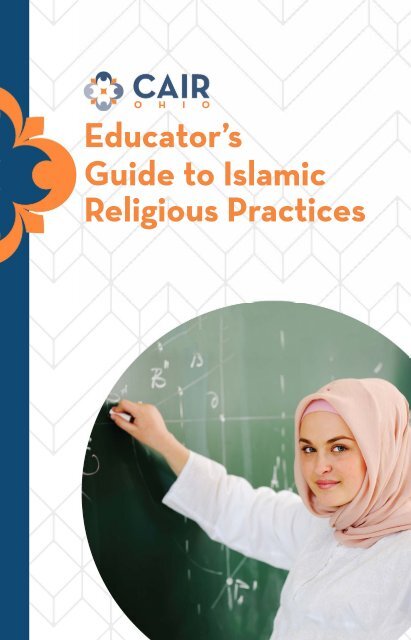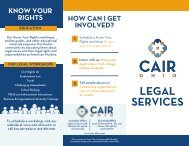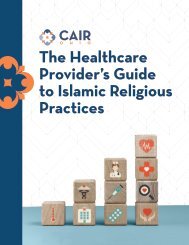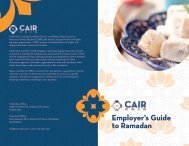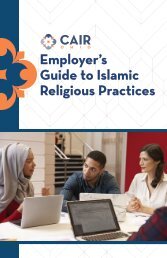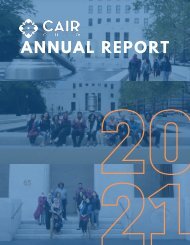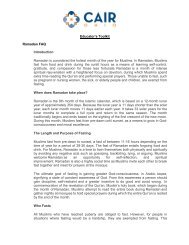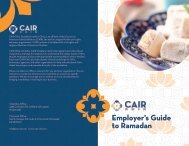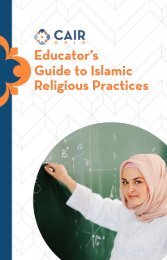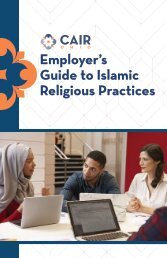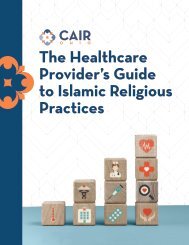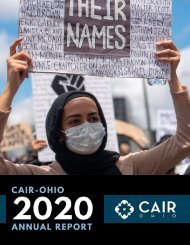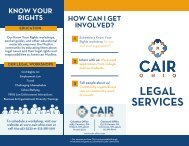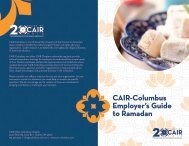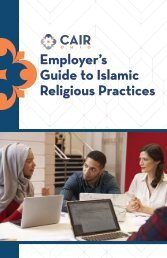CAIR-Ohio-Educators-Guide (2022)
- No tags were found...
Create successful ePaper yourself
Turn your PDF publications into a flip-book with our unique Google optimized e-Paper software.
0 M I 0<br />
Educator's<br />
<strong>Guide</strong> to Islamic<br />
Religious Practices
U. S. Legal Protections of Religious Rights<br />
Prayer, fasting, pilgrimage, religious celebrations, and dietary and<br />
clothing requirements are practices of the Muslim faith. They are<br />
considered bona fide religious beliefs, and those who practice them<br />
regard them as compulsory religious duties. These are protected by<br />
provisions in the Bill of Rights and in federal law:<br />
• The l=irst Amendment to the Constitution protects the free<br />
exercise of religion and prevents government from<br />
establishing a state religion.<br />
• Title VI of the Civil Rights Act of 1964 prohibits discrimination<br />
on the basis of race, color, and national origin in programs and<br />
activities receiving federal financial assistance. Schools that<br />
are recipients of federal funds must generally follow federal<br />
anti-discrimination policies or risk the loss of federal funds.<br />
• The qual Access Act of 1984 (upheld by the Supreme Court<br />
in 1990) affirms the right of student-initiated religious clubs to<br />
campus media and other resources if the school receives<br />
federal funds and permits other student non-curricular clubs<br />
to the same access and resources.<br />
2
Although TITL VI<br />
of the Civil Rights<br />
Act of 1964 does<br />
not directly cover<br />
religion, religiousbased<br />
harassment<br />
of muslim<br />
students is often<br />
based on shared<br />
ancestry of ethnic<br />
characteristics,<br />
which is covered.<br />
Many state laws contain prov1s1ons that<br />
protect religious rights from government<br />
infringement. In particular, many include<br />
important legal protections that require<br />
schools to take action against bullying and<br />
harassment of students, including that which<br />
is based on race, color, national origin, sex,<br />
or disability.<br />
<strong>Ohio</strong>'s anti-bullying law (O.R.C. § 3313.666)<br />
requires that "The board of education of<br />
each city, local, exempted village, and joint<br />
vocational school district shall establish a<br />
policy prohibiting harassment, intimidation,<br />
or bullying. The policy shall be developed in<br />
consultation with parents, school employees,<br />
school volunteers, students, and community<br />
members."<br />
3
Dietary Requirements<br />
The Qur'an (Islam's scripture) prohibits consumption of alcohol, pork, and any<br />
pork by-products or derivatives. Therefore, practicing Muslims are careful<br />
about the food they consume and how it is prepared. Muslims follow certain<br />
standards-called 1-lalal (permissible by Islamic law)-in slaughter and preparation<br />
of meat and poultry. Some objectionable food items include:<br />
• Pepperoni, sausage, and hot dogs containing pork<br />
• Bacon - alone or in soups, quiche, etc.<br />
• Animal shortening-in breads, puddings, cookies, cakes, donuts,<br />
etc. Vegetable shortening is acceptable<br />
• Gelatin - in Jello, desserts, candies, marshmallows, chocolates, etc.<br />
• Lard - in any product<br />
• l=ood ingredients containing alcohol, such as vanilla extract and<br />
Dijon mustard<br />
School lunch items containing ingredients derived from pork must be highlighted<br />
clearly, especially in elementary schools. !=or preschool and elementary food<br />
programs, many school cafeterias have been particularly helpful to Muslim<br />
parents and students by labeling such foods with a prominent visual marker,<br />
such as a red dot or a picture of a pig, for beginning readers. Most schools<br />
provide non-meat options or other alternatives to objectionable food items.<br />
Where parents are allowed to bring snacks or treats to the classroom, it is<br />
important to notify them that Muslim students may not be able to consume<br />
certain food items and to plan accordingly.<br />
4
Expressions of Personal Modesty<br />
Islam prescribes that both men and women behave and dress modestly. Muslims<br />
believe that an emphasis on modesty encourages society to value individuals for<br />
their wisdom, skills, and contribution to the community, rather than for physical<br />
attractiveness. There are a number of ways in which Muslims express such teachings.<br />
Men and young boys are required to wear clothing that covers them from the<br />
navel to just below the knee, however most choose to cover more than that to<br />
maintain standards of modesty. Also, some male Muslim students wear a small<br />
head covering, called a kufi. Many older boys choose to grow beards for religious<br />
reasons as well.<br />
When in public, Muslim women often wear loose-fitting, non-revealing clothing,<br />
known as hijab. This attire, which may vary in style, usually includes covering<br />
the hair, neck, and body. Some Muslim women may wear a face veil, commonly<br />
referred to as niqab.<br />
Schools may have uniform requirements and "no-hat" policies, as well as dress<br />
codes that mandate certain standards of appearance for students. 1-lowever,<br />
schools should provide appropriate modifications to their policies for religiouslymandated<br />
clothing such as head scarves.<br />
The wearing of a head covering may lead to teasing by other students. Teachers<br />
should prevent classmates from pulling on or removing a Muslim student's<br />
scarf. Such an action is a serious act of bullying and harassment that must be<br />
addressed by school staff and administration under <strong>Ohio</strong> law.<br />
5
Adolescence and Gender Relations<br />
Puberty is a major turning point in the life of a Muslim. !=or those who have reached<br />
puberty, Islam prescribes certain parameters for relations between persons of<br />
different genders. !=or example, many Muslims are reluctant to shake hands with<br />
persons of different genders, even with teachers or administrators. This should<br />
not be taken as an insult, but as a sign of personal modesty and respect.<br />
Physical Education<br />
Muslim students are encouraged to maintain minimum standards of modesty<br />
even in front of others of the same gender. Therefore, Muslim students may not<br />
feel comfortable showering with their classmates after phys ed or other sports.<br />
A private shower should be made available, or the Muslim student should be<br />
permitted to wear some type of covering in the shower, such as a swimsuit.<br />
School administrators should consider alternative uniforms for physical<br />
education classes, if applicable. Alternatives<br />
could include knee-length shorts for boys and full<br />
track suits for girls.<br />
Muslim students should not be forced to<br />
participate in coed swimming classes without a<br />
religious accommodation. Schools that require<br />
swimming skills have offered outside certification<br />
as an option or permitted Muslim students to<br />
swim in religiously appropriate clothing, such as a<br />
burkini or layered swim clothing.<br />
A burkini is a type<br />
of swimming suit for<br />
women which covers<br />
the whole body except<br />
for face,hands,and<br />
feet, while being light<br />
enough for swimming.<br />
Also, Muslims may raise religious objections to portions of coed physical<br />
education classes and to school-sponsored dances. In particular, activities<br />
where students of different genders are required to physically touch or come<br />
into contact with one another may be objectionable to Muslim students and<br />
families. No student should be pressured to participate or penalized for not<br />
taking part in such activities. Where possible, students should be provided with<br />
appropriate accommodations or with an alternate activity.
Muslim olidays<br />
Islamic holy days and festivals follow the lunar calendar. Like the solar calendar,<br />
the lunar calendar has twelve months. However, a lunar month, marked by the<br />
appearance of a new crescent moon in the horizon, may last only 29 days. A<br />
lunar year is about eleven days shorter than the solar year. This means that<br />
Islamic holidays occur about eleven days earlier each year, and that the dates<br />
for significant holidays will change with the school year.<br />
There are several days in the Muslim calendar with special religious significance,<br />
but the major celebrations common to all Muslims are the two Eid (holiday)<br />
days. The first Eid day is celebrated on the day after the month of Ramadan<br />
ends (the month of fasting) and<br />
is called Eid al-!=itr. The second<br />
is celebrated on the tenth day<br />
of the twelfth Islamic month<br />
and is called Eid al-Adha. The<br />
festivities include congregational<br />
prayer, gatherings with family<br />
and friends, and gifts and<br />
Pronunciation <strong>Guide</strong>:<br />
Eid al-l=itr: EED ull-l=ITTr<br />
Eid al-Adha: EED ull-AMD-ha<br />
Eid Mubarak: EED moo-BAR-ak<br />
entertainment, especially for children. A typical greeting on these occasions is<br />
"Eid Mubarak," or "Blessed Eid."<br />
Celebrating Eid requires that Muslims take at least one day off of school. There<br />
should be no penalty for this religious obligation. Because the occurrence of Eid<br />
depends on the sighting of the new moon, the exact date cannot be determined<br />
with certainty until a few days before the holiday. Most Muslim students and<br />
families do their best to notify their teachers and administrators as far in advance<br />
of the holiday as possible.<br />
Muslim communities around the country would like to see that Eid receives<br />
recognition similar to that given to Christmas and Hanukkah, especially in schools<br />
where Muslims constitute a significant segment of the student population.<br />
O.A.C. § 3301-69-02: ...(B) REGULATIONS GOVERNING EXCUSES FOR ABSENCE<br />
FROM SCHOOL FOR THE FOLLOWING REASONS: ••• (2 ) AN EXCUSE FOR ABSENCE<br />
FROM SCHOOL MAY BE APPROVED ON THE BASIS OF ONE OR MORE OF THE FOLLOWING<br />
CONDITIONS: ...(F} OBSERVANCE OF RELIGIOUS HOLIDAYS. {ANY CHILD SHALL BE<br />
EXCUSED IF ms/HER ABSENCE WAS FOR THE PURPOSE OF OBSERVING A RELIGIOUS<br />
HOLIDAY CONSISTENT WITH ms/HER TRULY HELD RELIGIOUS BELIEFS.)<br />
7
Where the number of Muslim students is low, schools can demonstrate<br />
commitment to diversity by refraining from marking students absent when<br />
they do not attend school on Eid. Also, major events (games, exams, plays, etc.)<br />
should be scheduled around these holidays.<br />
<strong>Ohio</strong> law requires that children be excused on religious holy days provided a<br />
parent or guardian requests the excused absence. See § O.A.C. 3301-69-02.<br />
Fasting<br />
The month of Ramadan, the ninth month of the Islamic lunar calendar, is the time<br />
when Muslims are required to fast. Fasting during Ramadan is one of the five<br />
"pillars" of Islam. (The other pillars include a declaration of faith, daily prayer,<br />
offering regular charity, and pilgrimage to Mecca.) Observing the Ramadan fast<br />
means refraining from eating and drinking from break of dawn to sunset. The<br />
dates of this fast change each year, so the fast will eventually rotate throughout<br />
the full solar year.<br />
Ramadan is a period of self-restraint<br />
and a time to focus on moral conduct.<br />
It is also a time to empathize with<br />
those who are less fortunate and<br />
appreciate what one has.<br />
Fasting is prescribed when children<br />
reach the age of puberty. Many<br />
Muslim families allow their young children to experiment with fasting throughout<br />
all or part of the day. Fasting students should be allowed to go to the school<br />
library or another safe space instead of the cafeteria during lunch. Also, they<br />
should be excused from strenuous physical activity during the fast, particularly<br />
when Ramadan falls during hot summer months. Teachers should monitor their<br />
students closely to ensure that Muslim students do not become dehydrated<br />
during hot weather.<br />
To turn the diversity in the classroom into educational advantage, many schools<br />
invite Muslim students or guest speakers to explain the practices and traditions<br />
surrounding the Ramadan fast. This will help Muslim students avoid a feeling of<br />
awkwardness about not having lunch with his or her fellow students during the<br />
month. By providing opportunities for students of varied religious backgrounds<br />
to share their special occasions, the school helps to support parents and<br />
communities in their efforts to teach beneficial values. Such information is also<br />
important preparation for students as future citizens.<br />
8
Curriculum Issues<br />
Many Muslims feel their faith has been treated with bias in textbooks and school<br />
programs. Although availability of more accurate and balanced instructional<br />
material is increasing, the continued use of outdated material in social studies<br />
and world history classes reinforces perceptions of Islam as a foreign creed<br />
and Muslims as enemies. Such divisiveness has contributed to incidents of<br />
harassment and violence against Muslim children by their schoolmates.<br />
In a number of cases, Muslim children have been mocked as "devil worshipers,"<br />
"sand n--gers," "towel heads," or "camel jockeys." Others are called "terrorists"<br />
or are taunted with references to violent extremists such as ISIS. Young Muslim<br />
women are often particularly vulnerable and have been subjected to physical<br />
assault or forceful removal of their headscarves.<br />
School boards may<br />
want to review policies<br />
and programs in light of<br />
the increasing Muslim<br />
population in the public<br />
school system. Textbooks<br />
that contribute to religious<br />
prejudice are not suitable<br />
for educating students.<br />
Books that lack reliable<br />
information are usually<br />
replete with mistakes<br />
about the basic Islamic<br />
beliefs. One common error is the definition of "Allah" as a particular Muslim<br />
god rather than the same God of Christianity and Judaism. Qualified Muslim<br />
educators should participate in the textbook selection process, particularly for<br />
history, social studies, and geography texts.<br />
Pledge of Allegiance<br />
Islam discourages acts of reverence to anyone or anything but God. Some<br />
Muslims may be hesitant to recite the pledge of allegiance. This, however,<br />
should not be taken as a sign of disrespect to the symbol of the nation. Many<br />
Muslim parents teach their children to stand up but not to recite the pledge.<br />
Federal and state laws prohibit public schools from forcing students to recite<br />
the pledge or penalizing them for refusing to do so.<br />
9
Family Life/Sex Education<br />
l=amily life and sex education material presented in schools is another sensitive<br />
matter to many Muslim families. In Islam, individuals become religiously<br />
responsible for their deeds when they reach puberty. Islam puts great emphasis<br />
on modesty, chastity and morality, and there is a specific set of teachings with<br />
regard to human development and its related issues.<br />
Close contact with local Islamic centers is essential to encourage input from the<br />
Muslim community. <strong>Ohio</strong> law requires that class materials should be available<br />
for review and parents should have the option to remove their children from all<br />
or part of the program.<br />
O.R.C. § 3313.60: ... (G) UPON THE REQUEST OF ANY PARENT OR LEGAL<br />
GUARDIAN OF A STUDENT, THE BOARD OF EDUCATION OF ANY SCHOOL DISTRICT<br />
SHALL PERMIT THE PARENT OR GUARDIAN TO PROMPTLY EXAMINE, WITH RESPECT<br />
TO THE PARENT'S OR GUARDIAN'S OWN CHILD:<br />
( 1) ANY SURVEY OR QUESTIONNAIRE, PRIOR TO ITS ADMINISTRATION TO THE CHILD;<br />
(2) ANY TEXTBOOK, WORKBOOK, SOFTWARE, VIDEO, OR OTHER INSTRUCTIONAL<br />
MATERIALS BEING USED BY THE DISTRICT IN CONNECTION WITH THE INSTRUCTION<br />
OF THE CHILD;<br />
(3) ANY COMPLETED AND GRADED TEST TAKEN OR SURVEY OR QUESTIONNAIRE<br />
FILLED OUT BY THE CHILD;<br />
( 4) COPIES OF THE STATEWIDE ACADEMIC STANDARDS AND EACH MODEL<br />
CURRICULUM DEVELOPED PURSUANT TO SECTION 3301.079 OF THE REVISED CODE,<br />
WHICH COPIES SHALL BE AVAILABLE AT ALL TIMES DURING SCHOOL HOURS IN EACH<br />
DISTRICT SCHOOL BUILDING.<br />
Religious Teachings and Proselytizing<br />
School curricula may include information on the history of religions, but it<br />
is prohibited for schools to teach a sectarian or religious doctrine. It is not<br />
appropriate for school resources to be used for proselytizing or distributing<br />
religious materials that are not part of a religiously neutral curriculum. Schools<br />
should also not allow third parties to intrude on the educational environment<br />
to proselytize or lead prayers during instructional programming or other schoolsponsored<br />
events.<br />
10
Daily Prayer<br />
Islam urges "God consciousness" in the individual's life. Muslims are required<br />
to perform prayer five times each day at specific times. Two out of the five<br />
prayers may fall within regular school hours. It usually takes less than 15 minutes<br />
to accomplish the religious requirements of the prayer. <strong>Ohio</strong> law permits those<br />
students or faculty who wish to participate in voluntary prayer to do so.<br />
0.R.C. § 3313.601: No BOARD OF EDUCATION OF A SCHOOL<br />
DISTRICT SHALL ADOPT ANY POLICY OR RULE .•. PROHIBITING<br />
ANY PUPIL FROM THE FREE, INDIVIDUAL, AND VOLUNTARY<br />
EXERCISE OR EXPRESSION OF THE PUPIL'S RELIGIOUS BELIEFS IN<br />
ANY PRIMARY OR SECONDARY SCHOOL. "<br />
Washing<br />
Before each prayer, Muslims are required to wash their faces, hands and feet<br />
with clean water. This washing is normally performed in a restroom sink or other<br />
facility that has running water, and takes about two minutes.<br />
Prayer Space and Time<br />
During the act of worship, which includes specific recitations from the Qur'an,<br />
Muslims will stand, bow and touch the forehead to the ground. Worship may be<br />
performed in any quiet, clean room. During the prayer, the worshipper will face<br />
11
toward Mecca (generally northeast in America). Total privacy is not required,<br />
however, others should not walk in front of or interrupt the worshipper during<br />
the prayer.<br />
During prayer, the worshipper is fully engaged. He or she may not respond to a<br />
conversation. Students and teachers should not take offense if the worshipper<br />
does not answer their call during the prayer. However in case of an emergency,<br />
Muslims will respond to an announcement by stopping the prayer immediately.<br />
Extracurricular Clubs<br />
Muslim students, like their counterparts from other faiths, can establish<br />
extracurricular clubs and organize prayer activities. The federal qua I Access Act<br />
provides that if other student religious clubs are allowed to use school resources<br />
such as an empty classroom or the PA system, then Muslim student clubs must<br />
be allowed access to those same resources.<br />
l=riday Congregational Prayer<br />
In Islam, Friday is the day for congregational worship, called Jum'ah. It is an<br />
obligation that must be fulfilled. Jum'ah lasts about one hour and takes place<br />
at the mosque during midday prayer. The service is similar to a Sunday church<br />
service, with a khutbah, or sermon, from the spiritual leader. Those who are<br />
conscientious about attending this prayer may request a temporary release<br />
from school or an extended lunch period. In high schools and universities<br />
where the number of students interested in performing the prayer is large, the<br />
function can be conducted by students on the school premises<br />
in an empty room or other appropriate space.<br />
12
Religious Accommodation Suggestions<br />
Pork and Pork By-products in Lunches<br />
• Mark items with a red dot or a picture of a pig.<br />
• Provide alternate lunch options, such as<br />
vegetarian meals and snacks.<br />
Muslim l-lolidays<br />
• Schedule exams and other major events around holidays.<br />
• Do not mark students absent, or note that<br />
their absence is excused for a religious holiday.<br />
Ramadan F'ast<br />
• Allow students to study in the library or<br />
elsewhere during lunch.<br />
• Monitor students for overheating or dehydration<br />
in excessively hot weather.<br />
Physical Education<br />
• Discuss clothing requirements with Muslim parents.<br />
• Be sensitive to gender relations and modesty issues that may<br />
arise in a mixed-gender exercise environment, particularly for<br />
students who have reached the age of puberty.<br />
• Provide students with alternate activities if they cannot participate.<br />
Gender Relations<br />
• Avoid touching when comforting students<br />
of the opposite gender (after they have<br />
reached or are around the age of puberty},<br />
and when interacting with parents of the<br />
opposite gender.<br />
• Respect students' boundaries and allow them<br />
to choose whether they wish to hug or hold<br />
hands with classmates of different genders.<br />
13
Family Life/Sex Education Program<br />
• Allow parents reasonable time to review any material dealing with<br />
sex education.<br />
• Allow children to opt-out from all or part of the family life program.<br />
Prayer<br />
• Allow Muslim students to pray in unused<br />
rooms during non-instructional time.<br />
• Provide them with privacy and space, as well as<br />
a clean place to perform ritual washing.<br />
Fairness in Classroom and Text Presentations<br />
• Check textbooks and curricula for religious bias.<br />
• Invite Muslim speakers to social studies and world<br />
religion classes.<br />
• l;:ncourage class discussion that embraces diversity,<br />
tolerance, and an inclusive classroom environment.<br />
14
<strong>CAIR</strong>-<strong>Ohio</strong>, founded in 1998 in <strong>Ohio</strong>, is an affiliate of the Council on<br />
American-Islamic Relations (<strong>CAIR</strong>), the nation’s largest Muslim civil rights<br />
advocacy organization. <strong>CAIR</strong>’s mission is to defend the civil rights and<br />
religious liberties of American Muslims.<br />
<strong>CAIR</strong>-<strong>Ohio</strong> and other <strong>CAIR</strong> Chapters nationwide regularly provide cultural<br />
competency trainings for employers to understand the unique needs of their<br />
Muslim employees and provide appropriate accommodations where needed.<br />
Each year <strong>CAIR</strong>-<strong>Ohio</strong> provides dozens of local workshops for <strong>Ohio</strong><br />
businesses, agencies, and other organizations to help educate about Islam,<br />
dispel stereotypes, and promote diversity in the workplace.<br />
Please consider our office a resource for you and your organization. You are<br />
welcome to contact us whenever you need help or answers to specific<br />
questions. We also encourage you to contact us if you are interested in<br />
bringing a workshop or training to your business.<br />
Columbus Office:<br />
4985 Cemetery Rd. | Hilliard, OH 43026<br />
614.451.3232<br />
Cincinnati Office:<br />
5740 Gateway Blvd., Suite 201 | Mason, OH 45040<br />
513.281.8200<br />
info@cair-ohio.com | www.cair-ohio.com


